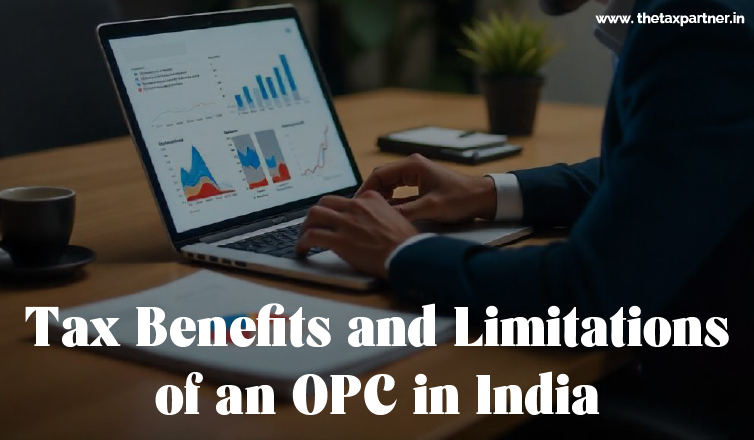Connect with us for all your queries



Consider the example of Radhika, an independent interior designer in New Delhi. After a few successful years as a freelancer, she wanted to give her business legal identity, credibility, and financial security—without involving other partners or shareholders. For professionals like Radhika, registering a One Person Company (OPC) offered the perfect blend of autonomy and protection.
The concept of OPC was introduced under the Companies Act, 2013, allowing a single person to operate a private limited company while enjoying benefits such as limited liability, structured compliance, and a distinct legal identity.
An OPC is a company that has only one person as a shareholder and director. This structure is ideal for solo entrepreneurs who want to operate a business with the recognition and credibility of a private limited company, while retaining full control.
Example: If Radhika registers her design firm as “Radhika Interiors OPC Pvt. Ltd.,” the company gains its own legal identity, and her personal finances remain protected even if the business incurs debts or losses.
The owner’s liability is limited to the amount invested in the business. Personal assets such as vehicles, savings, or real estate are not at risk if the business faces losses.
Example: If an OPC takes a loan of ₹5 lakhs and defaults, and the promoter has invested ₹1 lakh as capital, only the business assets can be liquidated—not the owner’s personal savings.
OPCs enjoy the recognition of being a private limited entity. This improves brand image, makes it easier to obtain loans, and builds trust with clients and vendors.
Example: A software consultant converting their sole proprietorship to an OPC may find it easier to sign contracts with large companies due to enhanced credibility.
The sole member acts as both the director and shareholder, enabling seamless decision-making without interference from partners or investors.
The nominee appointed during incorporation takes over the company in case of the owner's death or incapacity, ensuring business continuity.
OPCs registered under the Startup India scheme may be eligible for tax exemptions and funding opportunities subject to meeting prescribed criteria.
Despite its advantages, OPCs come with certain limitations that founders should be aware of.
Only one individual can be the member of an OPC. Inclusion of partners or shareholders is not allowed unless the OPC is converted into a Private Limited Company.
Example: If Radhika later wishes to include her brother as a co-owner, she must first convert the OPC to a multi-member company.
OPCs are required to meet annual compliance obligations similar to other companies. This includes appointment of auditors, filing of financial statements, annual returns, and maintaining statutory registers.
Most angel investors and venture capitalists prefer investing in private limited companies with multiple shareholders and a scalable governance structure.
Let us assume Ankit, an online seller, wants to register his business as an OPC. Here is how the process works:
The director must procure a DSC for signing e-forms.
DIN can be obtained through the SPICe+ form on the Ministry of Corporate Affairs (MCA) website.
Use SPICe+ Part A to reserve a unique name for the company. Names should comply with MCA naming guidelines.
Memorandum of Association (MOA) and Articles of Association (AOA) outline the company’s objectives and rules of operation.
Submit the incorporation documents including AGILE-PRO for PAN, TAN, GST registration, and ESIC/EPFO.
Once approved, the Registrar of Companies (ROC) issues the Certificate of Incorporation along with the Company Identification Number (CIN).
.png)
.png)
MCA Portal – Incorporation and company filings
Income Tax Portal – Income tax returns and updates
GST Portal – GST registration and filings
Startup India Portal – Startup registration and benefits
For solo founders running consulting firms, tech services, or independent practices, OPCs provide an ideal structure to begin formal business operations in India. They offer the legal benefits of a private limited company while maintaining ownership simplicity.
As CA (Dr.) Arpit Yadav, Co-founder of TwoTax, rightly puts it:
“The OPC model bridges the gap between informality and corporatization. For individual entrepreneurs, it’s the most effective way to scale responsibly.”
End-to-end OPC registration and legal documentation
Assistance with name approval and nominee documentation
Ongoing compliance and annual filings
Conversion to private limited company when ready to scale
Tax Partner is India’s most reliable online business service platform, dedicated to helping you in starting, growing, & flourishing your business with our wide array of expert services at a very affordable cost.